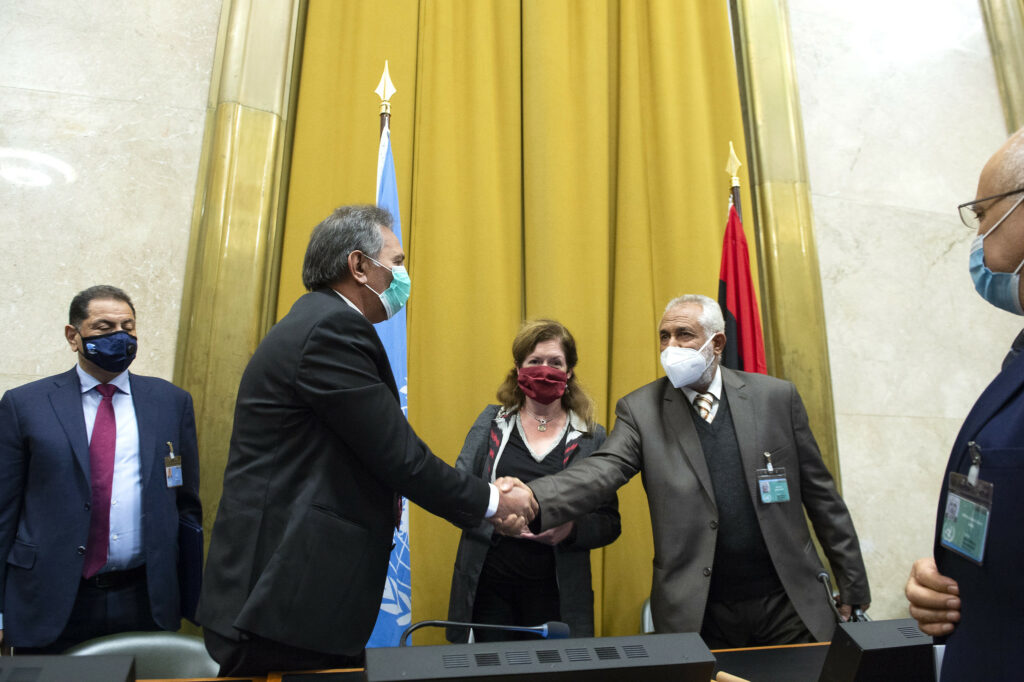
The two most important parties to the conflict in Libya, the Government of National Accord (GNA) and the Libyan National Army (LNA), agreed on October 23rd to an immediate and permanent ceasefire in Geneva under the auspices of the United Nations. The landmark deal – which took many Libya analysts by surprise – could possibly cement the already peaceful situation of a de facto ceasefire in place since June, when the LNA withdrew its forces from Tripoli.
Besides a freeze on all military agreements with foreign forces operating in Libya in general, the deal also implements various confidence-building measures such as the reopening of airports, seaports and roads between west and east Libya.
Another important feature agreed upon is the identification and categorization of all militias, with a view to reintegrating some of them into Libya’s armed forces.
The influence of militias, especially in and around Tripoli, has been a major factor in the destabilisation of post-Gaddafi Libya. The UN-recognised GNA has failed for example to demobilise its powerful forces, which had been used as justification by the LNA in its recent failed attempt to seize the capital.
Cautious optimism regarding this ceasefire agreement. Contentious issues moving forward:
– the departure of foreign forces & freeze on military agreements
– operationalizing cantonment of weaponry/ceasefire
– the DDR program proposed, which revives debates on who is a "militia" pic.twitter.com/MGIfxPDQIT— Emadeddin Badi (@emad_badi) October 23, 2020
The UN-brokered ceasefire has been received positively by many commentators, in contrast with the outcome of the Berlin Conference in January 2019, after which hostilities quickly flared up again due to the lack of any concrete mechanisms and guarantees. This new agreement seems to be more robust, even though many details have yet to be figured out by the committees. Additionally, the military stalemate on the ground over the past months has helped to put a political solution back on the table.
Acting Special Representative of the UN Secretary-General for Libya, Stephanie Williams, said in a statement: “Today is a good day for the Libyan people.” She added: “The parties agreed that all military units and armed groups on the frontlines shall return to their camps. This shall be accompanied by the departure of all mercenaries and foreign fighters from all Libyan territories – land, air and sea – within a maximum period of three months from today.”
International meddling had been one of the main drivers of the Libyan civil war. The GNA had received extensive support from Turkey in the recent past, which also introduced Syrian mercenaries to the conflict who had previously fought for the Syrian National Army against the Assad regime. The LNA in turn, supported by the United Arab Emirates, Russia and Egypt, has also allegedly made use of Syrian fighters as well as Sudanese mercenaries. The United States had become increasingly vocal this year as Russian mercenaries on the ground and in the air began playing an increasing role in Libya’s affairs. Some of those Russians are already said to have left the oil ports in both Sidra and Ras Lanuf.
International arms shipments and the influx of mercenaries on both sides fuelled the conflict with devastating consequences for civilians. From the overall 777 minimum civilian deaths recorded by Airwars since the end of the NATO campaign in 2011, 429 fatalities (55 per cent) occurred after the beginning of the LNA’s offensive in April 2019. While the LNA and the UAE were accused of causing 271 deaths, 85 fatalities were attributed by local sources to the GNA and its ally Turkey. The additional deaths could not clearly be attributed to any side.
Libya: Almost 300 civilians were locally reported killed during the LNA's recent failed siege of Tripoli.
Innovative interactive mapping from Airwars reveals the scale of violence experienced by local communities. https://t.co/hwFqCj093G pic.twitter.com/EgVPzfxEC5
— Airwars (@airwars) September 14, 2020
Ending international involvement in Libya will thus be crucial to finally putting an end to the civil war. However, it remains to be seen if all parties abide by the rules this time . President Erdogan of Turkey has already said that the agreement was “not reliable” as it was not made at the highest level.
Germany facilitated the difficult talks in Geneva, which included various parties to the conflict, with Foreign Minister Heiko Maas saying: “The inner-Libyan discussion formats agreed at the Berlin Conference in January culminated in a first, decisive success. Libya has not yet reached its goal, but has cleared an important hurdle towards peace.
It is clear that the people in Libya want and must shape the future of their country themselves. We therefore call on the international actors to support this path unreservedly and to refrain from any further interference.”